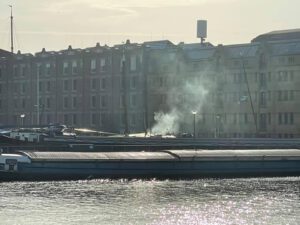It was a tough week for air quality folks. Suddenly, wood smoke is more important than traffic emissions. Even more harmful than smoking. Painful for policymakers. Until last year, home biomass burners were still getting subsidies for their poisonous smoke. We know better now. It is painful because those air quality people want us to drive emission-free. Now, it seems that we have miscalculated the effects for years, and suddenly, those expensive measures have different effects on clean air than first imagined. They may not help improve air quality.
Clean air policy: inside and outside
The Dutch Volkskrant investigated indoor air quality. Irons, cozy candles, the gas stove, and the Christmas gourmet set must be banned; ‘cooking kills’? In the past, the World Health Organization (WHO) frequently pointed out the greater health effects of particulate matter in our homes. Children who grow up in homes with a gas stove are 20 percent more likely to develop lung problems, compared to homes with an electric stove. Still so happy about your wood burner?
Premature death
We die earlier because of polluted air. But what is premature death anyway? A year, three months, or two days? Critical medical scientists are asking tough questions about whether the extra time is valuable or worth it. Of course, poor air quality is not healthy, especially for young people. Kids with asthma? No one wants that.
With all these new insights about air quality, I wonder: where are the parliamentary and local council questions? Rightful questions about adjusting the local clean air policy, reliable air quality and health effects monitoring, and clear standards for all emitters. Otherwise, the clean-air approach becomes a farce. We all have a right to clean air, inside and outside.
Zero-emission city logistics
Air quality is a complex mix of many different substances (NOx, PM, ozone, and more) with different effects on health. We now know that in traffic, emissions come from the exhaust, tires, and brakes. Yes, even from bike tires! Are the air quality arguments been selectively used by the local anti-car lobbies?
Should we, therefore, stop zero-emission city logistics? Of course not. Cleaner air really is better for everyone. But the contribution of electric driving to stopping climate change should be priority number one: less CO2 emissions. Even better is less traffic in residential areas and inner cities. City logistics must not only be cleaner but also less and safer. In addition to zero-emission zones, municipalities must regulate, stimulate, and facilitate less and safer city logistics.
Walther Ploos van Amstel.

